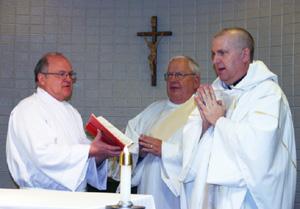
By Deacon Frank Agnoli
In the Mass, the Gloria follows the Act of Penitence; we rejoice that God is a merciful God. Since we recently celebrated Christmas, the scriptural source for this hymn should be very familiar (Luke 2:14)! As with the Confiteor, the current English translation did a lot of shortening and simplifying: dropping verbs, adjectives, and even entire phrases. The new translation expands the hymn back to its fuller form. It is not unusual in music to stress a concept or emphasize a point by repeating the same words, or by using different words to express the same idea. We see that with the Gloria: five verbs are used to refer to our actions in response to God’s graciousness instead of three, Christ’s Sonship is stressed, and John the Baptist’s words are repeated — but with a different petition following.
Note that “sins” is in the plural now, to match the invitation to Communion. This is an example of how traditional liturgical usage has differed from the use of the same phrase in the Scriptures. John the Baptist refers to the Lamb of God taking away the “sin” of the world in John 1:29; however, for more than 1,000 years we have used the plural liturgically. It is that tradition which is maintained in the new Missal.
The phrase, “people of good will,” may sound a bit odd to some, but it makes an important point. As Father Dan Merz of Missouri mentioned in his series (posted on our Web site), having a “good will” means that we’ve aligned our will with God’s, and that’s the only way that we will experience true peace.
The Collects (what we used to call the opening prayers) are all being retranslated. One difference that you may notice is in the closing to each of the prayers. Our current translations are misleading in two important ways.
First, the Latin begins, “Per Dominum nostrum,” that is, “Through our Lord.” Our current translation adds either “We ask this” or “Grant this” before the word “through.” The former means that our prayers ascend to the Father through the intercession of Jesus Christ and the latter means that they are answered through the mediation of the same. At the same time, “we ask” refers to our actions and “grant” refers to God’s. By omitting those two phrases, the Latin (and the new proposed translation) keeps the meaning as broad as possible: ascending and descending, horizontal and vertical.
Second, the current translation suggests that the ending of the prayer is Trinitarian — that it is referring to one God (Father, Son, Spirit). However, in the Latin, the word unitate is referring to the Spirit (not one God) and the word Deus (God) is referring to Christ, not the Trinity. Therefore, the conclusion of these prayers is more properly Christological. We pray through Christ who is God, and who is with the Father in the unity of the Spirit.
Please note that the final version of the collects has not yet been approved by Rome, so this is the translation proposed by the bishops.
(Deacon Agnoli is director of liturgy for the Diocese of Davenport.)
The Gloria
Present Text
Glory to God in the highest,
and peace to his people on earth.
Lord God, heavenly King,
almighty God and Father,
we worship you, we give you thanks,
we praise you for your glory.
Lord Jesus Christ,
only Son of the Father,
Lord God, Lamb of God,
you take away the sin of the world:
have mercy on us;
you are seated at the right hand of the Father:
receive our prayer.
For you alone are the Holy One,
you alone are the Lord,
you alone are the Most High, Jesus Christ,
with the Holy Spirit,
in the glory of God the Father. Amen.
New Text
Glory to God in the highest,
and on earth peace to people of good will.
We praise you, we bless you, we adore you,
we glorify you, we give you thanks for your
great glory, Lord God, heavenly King,
O God, almighty Father.
Lord Jesus Christ,
Only Begotten Son,
Lord God, Lamb of God,
Son of the Father,
you take away the sins of the world,
have mercy on us;
you take away the sins of the world,
receive our prayer;
you are seated at the right hand of the Father,
have mercy on us.
For you alone are the Holy One,
you alone are the Lord,
you alone are the Most High, Jesus Christ,
with the Holy Spirit,
in the glory of God the Father. Amen.
The Collects
Present TextWe ask (OR: Grant ) this
through our Lord Jesus Christ, your Son,
who lives and reigns with you
and the Holy Spirit,
one God, for ever and ever.
Proposed New Text
Through our Lord Jesus Christ your Son,
who lives and reigns with you
in the unity of the Holy Spirit,
God for ever and ever.








